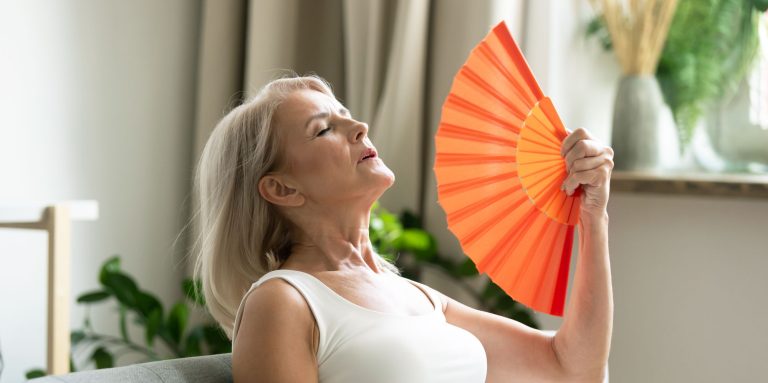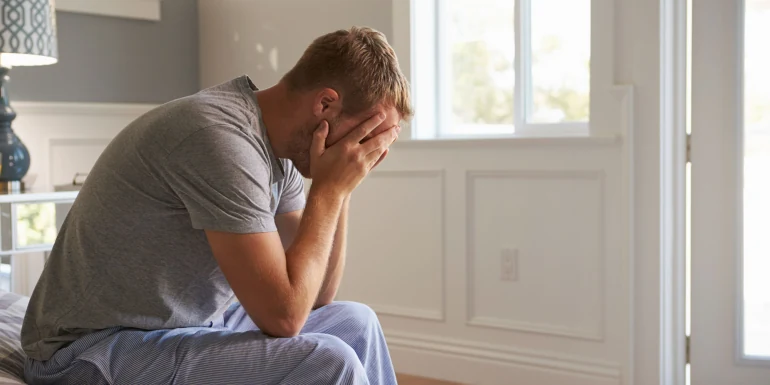
The menopause: symptoms, duration and treatment
What time of life does the menopause start and how long does the menopause last for women? What helps with symptoms such as hot flushes and weight gain? And what is the actual definition of the menopause?
What is the menopause?
When the fertile phase of a woman’s life comes to an end, a hormonal change starts that can last for years. The menopause – also known as the climacteric – begins. During this stage of her life, a woman’s egg production drops, as does the production of the female sex hormones oestrogen and progesterone, and her periods become less regular. The fertile phase of a woman’s life ends with her last menstrual period – which marks the start of the menopause.
When does the menopause begin? Most women start the menopause aged between 40 and 45. The menopause – which begins with a woman’s last menstrual period – commences in women aged 52 on average. Many women experience physical and mental changes during the menopause.
The phases of the menopause
Medical experts divide the menopause into different phases. Below you can see which symptoms can occur in the different phases of the menopause and which phase of the menopause is the worst.
Premenopause
Experts define the premenopause as a woman’s entire fertile phase before the menopause. At the end of the premenopause, the functioning of the ovaries starts to diminish. A woman’s body slowly produces less of the sex hormones oestrogen and progesterone.
Perimenopause
This phase of hormonal changes and the symptoms associated with it often start with the perimenopause. Perimenopause is the term used to describe the time period – which is not specifically defined – in a woman’s reproductive life cycle around the menopause. This begins just a few years before her final menstrual period. The ovaries’ function decreases progressively until it finally stops altogether. At first, women experience strong hormonal fluctuations. Their body gradually cuts back production of the sex hormones oestrogen and progesterone. Their periods become increasingly irregular. Menopausal symptoms can occur from this point onwards, although a third of women have no symptoms at all and another third only a few. One in three women suffers severely from the hormonal changes; their quality of life can be hugely affected.
There are many possible symptoms that can occur individually or in combination. This varies from woman to woman. How much a woman’s well-being suffers depends on how many different symptoms she has simultaneously and how severe the individual symptoms are.
The following symptoms can occur during the perimenopause:
- Women can suffer sweating and hot flushes during this time of hormonal changes. They often experience night sweats.
- They have heart palpitations, their heart races or skips a beat.
- Women also often complain of sleep issues during this phase of life. They have problems falling asleep and sleeping through the night.
- Tiredness, listlessness, melancholy, sadness, crying and mood swings are also typical menopausal symptoms.
- Increased irritability (nervousness, inner tension, aggressiveness) can also occur during this time.
- Feeling mentally exhausted and having problems concentrating all make day-to-day life harder.
- Periods are also more irregular, and sometimes don’t come at all.
- Sexual problems occur – many sufferers experience a loss of libido.
- A frequent urge to urinate is additionally a common complaint.
- The mucous membranes and skin become dry during this stage. Itchiness increases.
- Weight gain is another common issue at this point.
- Some women complain of water retention. This can, in some cases, intensify weight gain at this point.
- Women may also get migraines during this time.
- Their hair becomes thinner. Hair loss during the perimenopause is thus not uncommon. In addition, facial hair growth increases. Some women develop the typical “lady beard”. This is caused by the relative surplus of testosterone compared to the declining female hormones.
- Muscle and joint pain can occur in this time of change, too.
Menopause
The “menopause” is when a woman has her last menstrual period. It marks the onset of infertility. The production of eggs and the sex hormones oestrogen and progesterone stops completely. This deficiency results in various symptoms, the same menopausal symptoms as in the perimenopause.
When does the menopause begin? The menopause starts on average at the age of 52. The menopause can only be identified retrospectively, after a woman has not had a period for a year.
Postmenopause
Once the menopause has been confirmed, women enter the postmenopause. Postmenopause is the period of time after the menopause until the woman dies. All ovarian activity has ceased and the hormonal balance has settled down. The sex hormones are completely absent. Are the menopausal symptoms now over? For some women, menopausal symptoms now ease off, while for others they persist unchanged and new problems also sometimes arise.
Women do not get periods during the postmenopause. Any vaginal bleeding during the postmenopause is viewed as suspicious and must therefore be investigated. In this case, a curettage procedure may be necessary after the menopause. Doctors use this to identify the cause of the bleeding.
The lack of oestrogen production also accelerates bone loss. The risk of cardiovascular diseases and diabetes also rises.
The menopause also affects a woman’s sexuality. Some women experience a loss of libido during this phase of life. This is caused by a decrease in their oestrogen levels. In addition, there are changes happening in a woman’s life: their children move out, their parents require care or pass away and their relationship with their partner is no longer smooth sailing as they may be going through a midlife crisis themselves. But some women suddenly feel strong sexual desires during the menopause. They feel comfortable in their bodies and are well balanced. Whether the menopause affects libido thus varies from woman to woman. Talk to your gynaecologist if you feel that this phase of change is affecting your sexuality.
Menopause: when should you consult a doctor?
As a general rule, always see your doctor if you experience any symptoms. Every woman ought to know that menopausal symptoms are not a given: women who suffer from them can seek treatment. Besides herbal remedies (phytotherapy), bioidentical and synthetic hormones are also available to replace the hormones that your body loses.
However, it is vital that you consult a specialist at the latest if your symptoms worsen or persist over a long period of time. You should also see a doctor if your discharge changes during the menopause. A yellow colour and an unpleasant odour, for example, indicate a vaginal infection, which you are generally more susceptible to during the menopause. Consulting the doctor is also advisable if you experience pain when urinating and have a frequent urge to urinate during the menopause. This might be a sign that you have an infection.
How long does the menopause last?
The menopause lasts for a different amount of time from woman to woman. On average, women suffer menopausal symptoms for 7.4 years. In exceptional cases, the symptoms last just a few months. On average, the menopause ends between the ages of 60 and 65. But ten percent of all women over 70 still suffer from menopausal symptoms.
Doctors refer to early menopause if this occurs before the age of 45. The technical term “premature ovarian insufficiency” refers to the onset of the menopause before the age of 40. Around 10% of women are affected by early menopause before the age of 45 and 1% by premature ovarian insufficiency before the age of 40. Both these conditions are pathological and require treatment. With ovarian function ceasing at such an early age, there is a medical need for hormone replacement therapy, otherwise the risk of developing osteoporosis, dementia and cardiovascular diseases increases. Furthermore, the overall mortality rate for sufferers is increased. There are various reasons for the menopause starting too early. These include certain medications and illnesses.
Menopause: treating the symptoms
There are various remedies for menopausal symptoms. These include medicinal therapies, as well as treatments with herbal preparations:
- Hormone therapy: experts say that hormone therapy or hormone replacement therapy is most effective for severe menopausal symptoms and is better than all other treatment methods. Doctors use this therapy to treat the imbalance or lack of hormones during the menopause. Hot flushes are a common indication for this therapy. The dosage forms available include tablets, creams and hormone patches. Hormone replacement therapy requires a full risk-benefit assessment, so make sure you consult your doctor about what side effects may occur.
- Herbal remedies: apart from hormonal menopause medication, you can also take herbal preparations. These contain, for example, red clover, black cohosh or monk’s pepper to combat menopausal symptoms.
Experts say that a new therapy with hormone-free active ingredients can also help with hot flushes and night sweats.
Do you have menopausal symptoms? Talk to your doctor and get advice.
What can you do to combat hot flushes during the menopause?
Normally, women mainly experience severe hot flushes during the perimenopause and menopause. Tablets or capsules containing red clover or monk’s pepper can alleviate these symptoms if necessary, as can hormone replacement therapy or treatment with hormone-free active ingredients. Talk to your doctor before you take these preparations.
What else helps against hot flushes?
- Make sure you have a balanced diet. Eat fresh fruit and vegetables. Only eat sweets and fatty food occasionally.
- Avoid stress. Relax, for example by doing autogenic training or progressive muscle relaxation.
- Wear lightweight and breathable clothing, made of cotton or linen, for example. Also use breathable bed linen.
- Take hot/cold sequence showers every morning. This helps your body to regulate heat better. Always start with warm water and end the shower with cold water. It’s best to get dressed straight afterwards so that you can warm up again.
- Weight loss is also very effective. This has been proven to lessen the frequency and intensity of hot flushes.
Weight gain in the menopause: what can you do about it?
Should you want to maintain your weight or even lose some during the menopause, this is a bit more difficult due to the hormonal changes. If you don’t want to gain weight during the menopause, you will automatically have to eat less or increase the amount of exercise you do.
- Diet is particularly important during the menopause. The amount of calories you require decreases, not just due to hormonal changes, but also due to age-related muscle loss. This means you need fewer calories than before, so you should adjust your diet over the long term. Eat a balanced diet and reduce your daily calorie intake.
- Get enough exercise. A mix of endurance sports and strength training is best. Sports like hiking, jogging, walking, cycling or swimming boost your stamina and prevent weight gain during the menopause. Targeted, intensive muscle training not only strengthens the body: it also increases your basal metabolic rate. Muscles use up a lot of energy. As your energy needs decrease with age, you can counter weight gain by building up more muscle. A good activity for retaining your mobility and balance, for example, is yoga. To get more exercise in everyday life, take the stairs instead of the lift, and for short distances, walk.
The right balance of diet and exercise allows you to counter weight gain during the menopause. Ideally, get extra help from your doctor.
How to stop hair loss during the menopause?
There are various ways to stop hair loss during the menopause:
- Incorporate wholegrain oats, lentils, pumpkin seeds, sesame seeds and sunflower seeds into your diet. These foods are rich in zinc and iron – ideal for combating hair loss. Taking biotin, folic acid and vitamin D3 supplements is also a good idea if you are deficient in these.
If your hair loss doesn’t improve, talk to your doctor. They will prescribe medication if necessary.
Menopause: how can you alleviate mood swings?
During the menopause, you may find that herbal remedies assist with mood swings. Hormone replacement therapy can be useful, too, or, if psychological symptoms get out of hand, psychotropic medication can help. Tablets or capsules containing ginseng or St. John’s Wort are popular. Take these after consulting a medical specialist. These things will also help:
- Staying active. Get some exercise and perhaps try out a new hobby.
- Create a positive social environment around you. Surround yourself with people who are good for you. Regular social contact will help you.
- Reduce stress where you can. Also make sure that you’re getting enough sleep. Exercises to increase mindfulness can help you feel more relaxed in your daily life.
Please note: if you notice yourself showing signs of depression during the menopause, contact your doctor directly. In some cases, you may need psychotherapeutic support. Treatment with medication may also be advisable.
The menopause is a normal phase in every woman’s life, and not all women avoid going through this period in their life unaffected. If your performance and quality of life are severely impaired by menopausal symptoms, you need to take action. With the right steps, you can cope well during this time. Take care of yourself and seek medical advice if necessary: trust your body and get support if you need it.
The specialist provided the editorial team with advice and input for this article. Susanna Weidlinger works as a consultant in the clinic for gynaecological endocrinology and reproductive medicine at the Department of Obstetrics and Gynaecology in Bern. She is President of the Swiss Society for Gynaecological Endocrinology, Contraception and Menopause (SGEM).


Newsletter
Find out more about current health issues every month and get all the information you need about our attractive offers from all Helsana Group companies * delivered by e-mail to read whenever it suits you. Our newsletter is free of charge and you can sign up here:
We did not receive your information. Please try again later.
* The Helsana Group comprises Helsana Insurance Company Ltd, Helsana Supplementary Insurances Ltd and Helsana Accidents Ltd.